The plumbing and heating/cooling (HVAC) systems in your home work together to keep your family comfortable throughout the year. But when one system starts to fail, it can quickly affect the other. This article will give you an overview of how plumbing problems can affect your HVAC system– and what you can do to avoid or fix them.
Water heaters are one of the most common ways plumbing problems can affect your HVAC system. If the water heater pilot light goes out, it can cause your furnace to malfunction. While this may not seem a big deal, it can be quite dangerous. A furnace that isn’t working properly can release carbon monoxide, which is a deadly gas.
Another way that plumbing problems can affect your HVAC system is by causing water damage. Even a minor water leak can cause extensive water damage to your home. This water damage can result in mold growth, which can cause health problems for you and your family. In addition, water damage can also cause your HVAC system to malfunction.
If you’re having plumbing problems, having them fixed as soon as possible is necessary. Not only can plumbing issues cause damage to your HVAC system, but they can also lead to other problems.
What Are The Most Common Plumbing Problems?
Imagine coming home tired from a long day at work only to find out that your toilet is overflowing. Or perhaps you went to take a shower to discover that the water pressure is so low you can barely get wet.
These are just two of the most common and many plumbing problems that can leave you frustrated. In this section, you’ll tackle three of the most common plumbing problems that impact your HVAC system. These include:
1. Drainage Issues
If the drains in your home are slow or clogged, it can put a strain on your plumbing system – and potentially cause problems with your HVAC system. In particular, clogged drains can cause your water heater to overheat, resulting in severe damage.
This problem is often caused by a build-up of hair, soap scum, and other debris in the drains. To help prevent drainage issues, keep your drain clean, and don’t put anything down that doesn’t belong (e.g., grease, food scraps, etc.).
Most homes are built with the main sewer line that carries all the wastewater from the house to the municipal sewer system. If the sewer line becomes clogged, sewage can back up into your home, which is undeniably gross and dangerous to your health. A professional plumber can unclog your main sewer line and restore your plumbing system.
2. Water Leaks
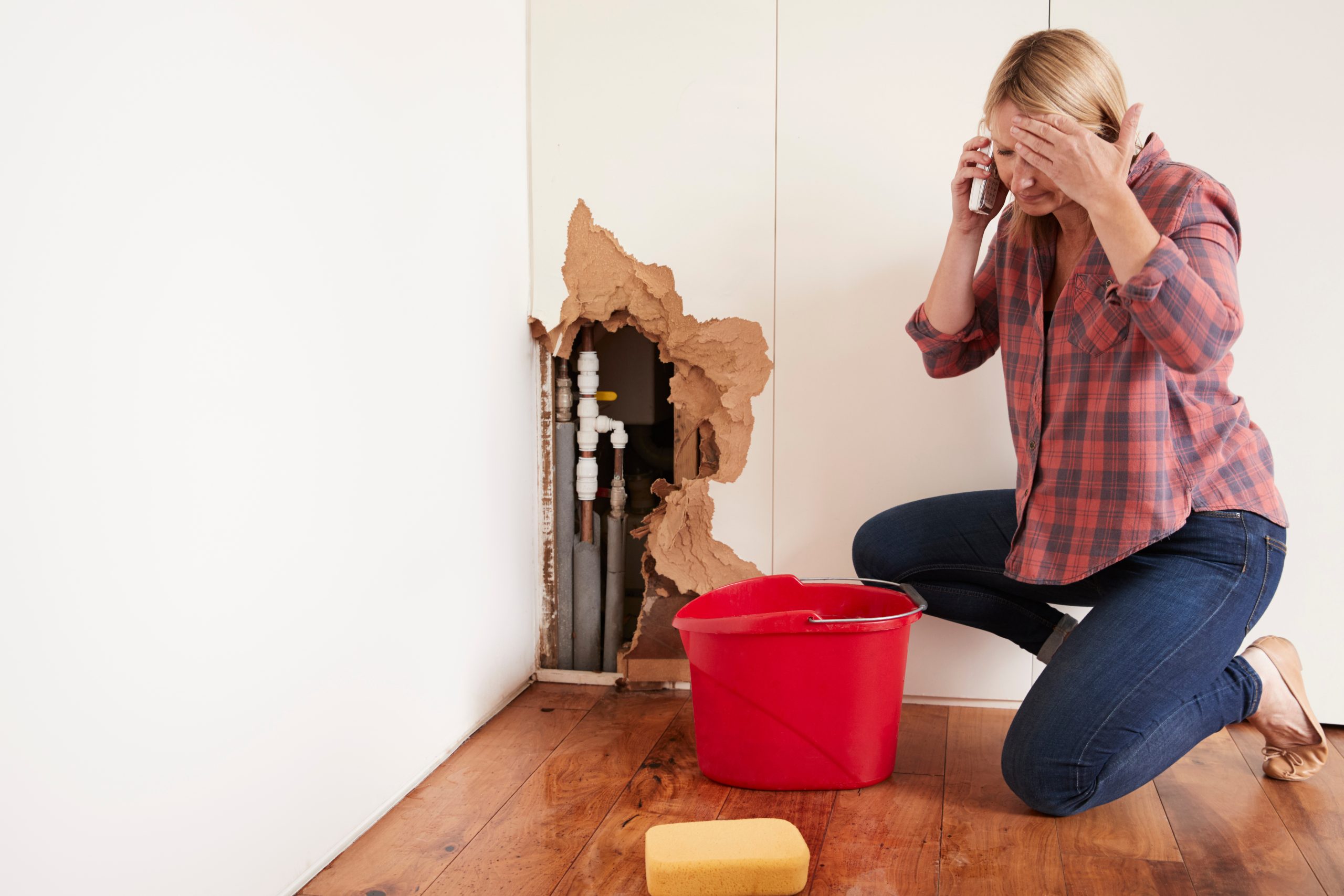
Middle aged woman with a burst water pipe phoning for help
Even small water leaks can cause big problems. Not only will it waste water (and money); but it can also lead to mold and mildew growth, spreading into your HVAC system.
A water leak can also damage your home’s foundation, affecting the stability of your entire house–including your HVAC system.
If you suspect a water leak, you must have it fixed as soon as possible. A professional plumber will be able to locate the source of the leak and make the necessary repairs.
3. Frozen Pipes
Another common plumbing problem that can indirectly impact your HVAC system is frozen pipes. If the pipes that supply water to your furnace or air conditioner freeze, it can prevent those systems from working properly.
Frozen pipes are most common in the winter but can happen at any time of year when your home’s temperature suddenly drops. It’s important to monitor the temperature in your home and take steps to prevent your pipes from freezing (e.g., exposed insulating pipes).
If you have frozen pipes, you should thaw them out as soon as possible. A professional plumber can help you safely thaw out your pipes and ensure they’re in good working condition.
How Are Plumbing And HVAC Systems Interconnected?
You may haven’t thought about this yet, but your home’s plumbing and heating/cooling systems are interconnected in a few ways.
First, your HVAC system requires water to function properly. If any leaks happen in your plumbing, they can impact your HVAC system. Additionally, your thermostat must be located away from water sources to avoid damage. Finally, if your HVAC system cannot keep up with your heating and cooling needs, it could be due to damage to your ductwork.
It’s important to address plumbing problems quickly because they can cause several issues with your HVAC system. These plumbing problems can range from minor annoyances to major repairs.
Here are different types of HVAC problems that can be caused or exacerbated by plumbing problems:
1. Indoor Air Quality Problems
If your HVAC system is connected to slow or clogged drains, it can draw mold and mildew into your home, impacting indoor air quality.
A drop in air pressure in your home can also cause indoor air quality problems. If the pipes that bring air to your HVAC system are leaking, it can cause a drop in air pressure which can lead to many different issues, including:
- Dirty Socks Syndrome
This is when your furnace pulls dirt, dust, and other airborne particles into your home.
- Musty Odors
If your HVAC system is connected to slow or clogged drain pipes, it can pull mold and mildew into your home – causing musty odors.
- Allergies And Asthma Attacks
Exposure to mold and mildew can trigger an allergic reaction or asthma attack if you have allergies or asthma.
Poor indoor air quality can be alleviated by regularly cleaning your drains, changing your furnace filter, and investing in an air purifier and cyclopentane refrigerant. However, if you experience any of these problems, you should have your HVAC system checked by a professional. They can identify the source of the problem and recommend the best solution.
2. Thermostat Issues
If your thermostat is located near a water leak, it can be damaged by the water. Water damage can cause your thermostat to give inaccurate readings, making it difficult to maintain a comfortable temperature in your home. It’s also possible for your thermostat to be affected by a power surge from a nearby lightning strike.
If your thermostat is having problems, you should have it replaced by a professional. They can help you choose the right thermostat for your home and ensure that it’s properly installed.
3. HVAC System Capacity
Damaged ductwork might cause your HVAC system to not properly heat or cool your home. It can be caused by water leaks, rodents, or physical damage.
If your HVAC system cannot keep up with your heating and cooling needs, you should have it inspected by a professional. They can identify the source of the problem and make the necessary repairs.
4. System Overheating
As mentioned, clogged drains can cause your water heater to overheat. But if your furnace is located next to your water heater, the overheating can spread and cause your furnace to overheat.
An overheating furnace can spread contaminants through your home and cause your indoor air quality to suffer, and can even lead to a fire if the problem isn’t fixed. If you think your furnace is overheating, you should have it checked by a professional as soon as possible. You should also have your furnace regularly serviced to ensure it’s in good working condition.
5. System Shutdowns
The water supply lines to your HVAC system may freeze, causing those systems to shut down. In some cases, the system may be able to restart once the pipes have thawed. But in other cases, the damage may be too severe – and you may need to call a professional for repairs.
As you can see, your home’s plumbing and HVAC systems are closely interconnected. So, it’s important to be aware of the signs for both plumbing and HVAC problems – and to contact a professional if you suspect there may be an issue.
How To Prevent Plumbing And HVAC Problems
According to Energy.gov, plumbing and HVAC systems account for about 50% of a home’s energy use. So, it’s necessary to take steps to ensure that those systems operate efficiently.
Here are some tips for preventing HVAC problems:
1. Inspect Your Drains Regularly
You should inspect your drains regularly for any clogs or blockages. You can use an ordinary plunger to clear minor clogs, but more severe ones may require the help of a professional.
In addition to inspecting your drains, you should also clean them regularly. It’ll help prevent mold and mildew from growing and impacting your indoor air quality.
2. Fix Water Leaks Right Away
If you notice any water leaks in your plumbing lines, they must be fixed immediately. Small leaks can quickly turn into big ones – and cause significant damage to your home. A professional plumber can help you identify and repair the source of the leak.
3. Insulate Your Pipes
If you live in an area common to freezing temperatures, you should insulate your pipes to keep them from freezing. You can find pipe insulation at most hardware stores. Insulating your pipes is a relatively easy do-it-yourself project, but you can also hire a professional to do it for you.
4. Regularly Change Your HVAC Filter
You should regularly change your HVAC filter to ensure that it’s clean and working properly. A dirty or clogged filter can restrict airflow and force your system to work harder, leading to higher energy bills.
It’s generally recommended that you replace your HVAC filter every three months. But if you have furry friends or live in a dusty area, you may need to change it more often.
5. Invest In Regular HVAC Maintenance
By investing in regular maintenance, you can help prevent HVAC problems caused by plumbing issues. A qualified technician can inspect your HVAC system and identify any potential problems. They can also clean your ductwork and check for any leaks. Investing in regular maintenance will help keep your HVAC system running smoothly and prevent any major problems from developing.
Maximizing Energy Efficiency in Your Home
Plumbing and HVAC problems can not only cause problems in those systems–but they can also lead to decreased energy efficiency in your home. If you’re not careful, those problems can cost you money in the long run.
According to the Department of Energy, around $14USD billion is wasted each year on repairs due to inefficient HVAC systems. And plumbing problems can also lead to wasted energy – and increased utility bills. So, it’s important to take steps to ensure that your home’s plumbing and HVAC systems are running efficiently. Some of the best ways to do that include:
- Check For Air Leaks
Air leaks are one of the biggest sources of energy loss in a home. Those leaks can let heat escape in the winter and cool air escape in the summer. As a result, your HVAC system has to work harder to maintain a comfortable temperature and your energy bills go up. You can help prevent air leaks by caulking and weatherstripping gaps around windows and doors. You should also check for any leaks in your ductwork and have them sealed.
- Install A Programmable Thermostat
Programmable thermostats are popular among homeowners today because they can help save money on energy bills by allowing you to set specific room temperatures for different times of the day. For instance, you can set the temperature lower when you’re not home and higher when you are.
- Invest In Energy-Efficient Appliances
If your appliances are outdated, they may not be as energy efficient as newer models. Investing in energy-efficient and smart appliances can help you save money on your energy bills while also benefiting the environment.
Plumbing and HVAC problems can be complex, and fixing them on your own can make things worse. If you’re having plumbing or HVAC system issues, it’s best to seek professional help. Scheduling regular maintenance checks can help you identify the problem and come up with a solution.
On top of that, a professional will also be able to help you prevent future problems. They can clean your ductwork and inspect your system for any potential issues. Investing in professional help can save you money and a lot of headaches down the road.
Final Thoughts
Plumbing and HVAC problems can significantly impact your home– and your wallet. If you’re having problems with either system, taking action is imperative. And if you experience any issues, a professional can help you get your system back up and running quickly and efficiently.

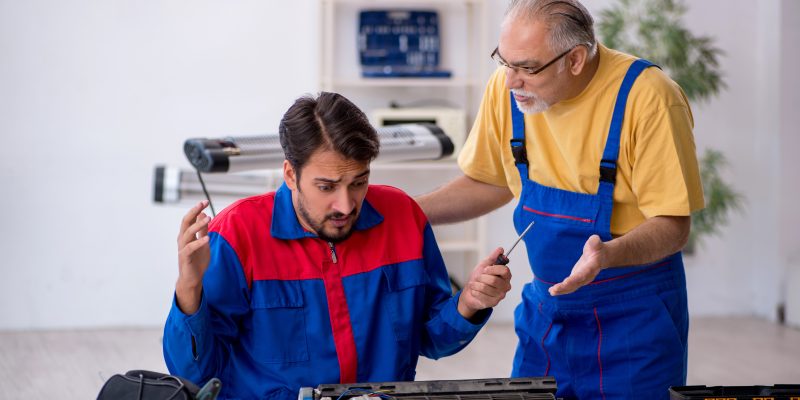
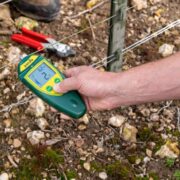
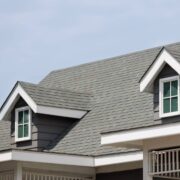
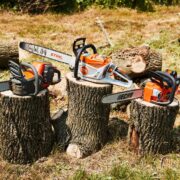

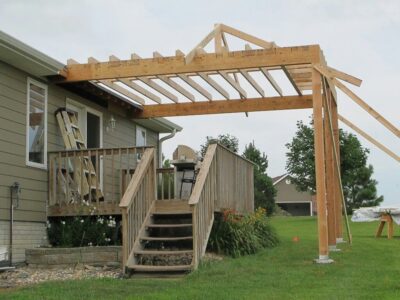
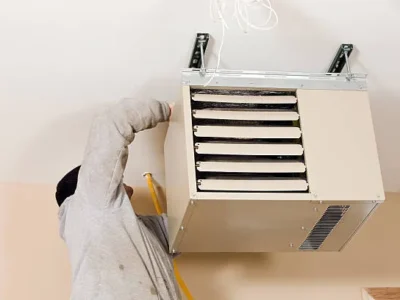
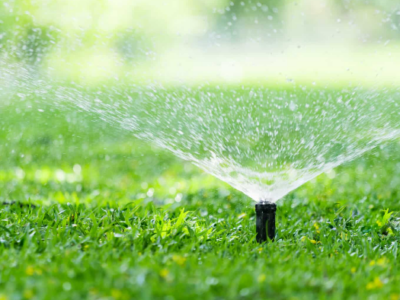
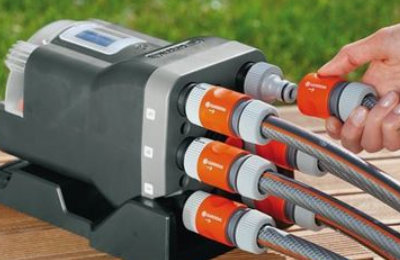
Comments